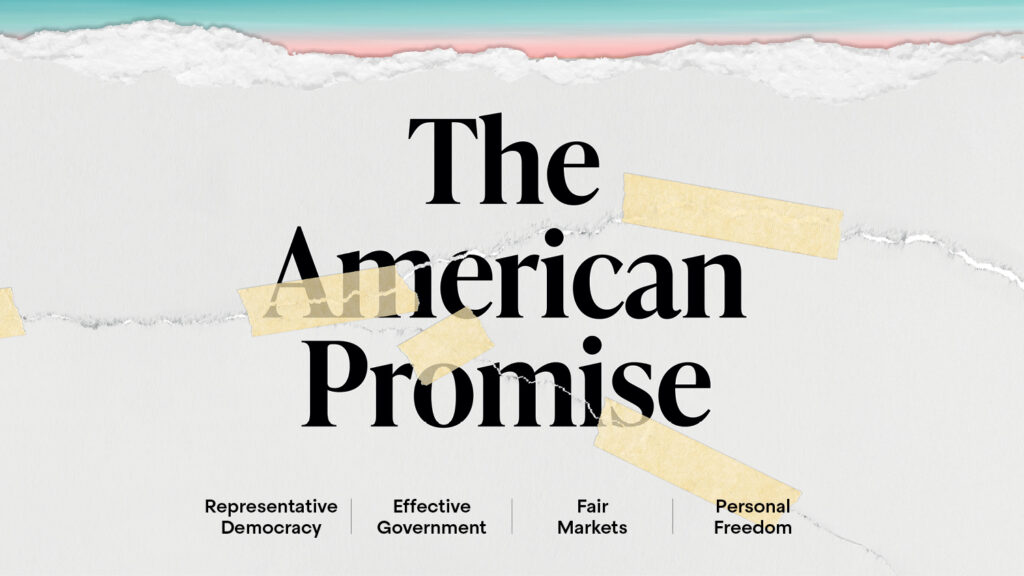Listening to MAHA
Why Democrats need to stop defending the public-health status quo and pay closer heed to concerns raised by MAHA as they reckon with its popularity among voters
- By Rachael Bedard

The year 2020 was a universally difficult time, after which many aspects of life seemed to become a little harder and a little worse for everyone. The COVID pandemic accelerated several social, cultural, and political trends that directly contributed to Democrats’ electoral losses in 2024. “What we talk about when we talk about COVID” usually includes sharp critiques of prolonged social-distancing measures, including school shutdowns; consternation about inflation exacerbated by supply-chain disruptions; angst about worsening urban disorder and crime; concern about social isolation and loneliness; and diminished trust in American institutions. Curiously, what often feels undermentioned in all of these postmortems is the direct impact of a virus that killed over a million Americans and the way the pandemic made public health a central topic in the culture wars.
Although healthcare has traditionally been a winning issue for Democrats, the contemporary discourse on health and public health has been nothing short of disastrous. Democrats—the party of cautious, prosocial, high-trust, government-loving elites—tend to approach questions about vaccination, reproductive rights, mental health, and transgender care as arguments over facts. Armed with better evidence, Democrats tend to become agitated in defense of science contra mysticism and try to win people over with moral superiority and meta-analyses. The body politics of the moment, however, are less about facts than about fundamental values—about personal liberty and collective safety, about when we employ coercion and why, and about how we think of wellness, science, and technology. Robert F. Kennedy Jr.’s MAHA (Make America Healthy Again) movement engages these questions as the central concerns of our time.
At its darkest heart, MAHA is animated by conspiracy theories about elite plots to sow sickness for profit and domination. As the author Hari Kunzru wrote recently in the New York Review of Books, “the pandemic appeared to them a kind of epidemiological Reichstag fire, an emergency fabricated as a pretense for an intensification of government control.” But MAHA also provides a political home for a diverse array of basically benign constituencies, including mothers worried about the toxic ingredients in their children’s cereal; devout communities who refuse vaccinations on religious grounds; mental-health advocates wary of overtreatment; and pharma skeptics from across the traditional political spectrum.
This very new coalition was previously nonpartisan and only recently radicalized, and is theoretically still up for grabs. Its influence is growing, and it is vital to achieve something like consensus with it on a number of critical health questions not only to win elections, but also in order for the social compact to work. To do this, Democrats need to stop defending a bad public-health status quo. They need to communicate less in the cautious and impersonal language of the academy; and stop overstating the urgency of their claims and the strength of the evidence behind them. Instead, those of us who care about public health need to do more listening, respectfully acknowledge differences of opinion, prioritize our concerns, and prepare to compromise where we can. Above all, we must get much more creative and ambitious about public health. This is work that can be done now, in the states, to both protect and advance our collective well-being even with Trump and Kennedy in D.C.
In August 2024, when Kennedy dropped out of the presidential race and decided to endorse Donald Trump, he was polling at around 7% of registered voters. Kennedy’s median supporters were younger than the average voter, and nearly three-quarters of them identified as political independents. Over 60% reported that they had unfavorable opinions of both Donald Trump and Kamala Harris.
Kennedy’s appeal, in other words, was to the hard-to-reach, inconsistent voters whose most strongly held beliefs fell outside the usual political-issue space. It is these voters who put Trump over the top to win the popular vote. In the wake of the election, some pundits have wondered whether the Harris campaign made an error in not extending Kennedy an invitation to bring his following over to the Democrats. Revulsion at Kennedy’s weirdness, confidence in Harris’s chances, and an understandable unwillingness to give credence to a movement founded around anti-vax misinformation made this impossible.
So Democrats didn’t make the offer, Trump did, and MAHA merged with MAGA. And, by spurning Kennedy’s cause so aggressively, the party gave up more than it perhaps intended to: Not just those 7% of registered voters, but a chance to make inroads with a growing population of Americans who believe that the country’s chronic disease and obesity epidemics, intensifying mental-health and overdose crises, and relatively poor life expectancy are the direct result of government indifference and malfeasance. Even though Donald Trump is the president who brought us Operation Warp Speed, he smoothly distanced himself from that accomplishment and happily let Democrats become the party associated with the COVID response. Critiques of the public-health establishment became de facto critiques of the Democratic party.
These attacks force Democrats into a corner where they’re reflexively defending things that no one wants to defend: pharmaceutical companies, a cumbersome and occasionally corrupt drug-approval process, the right of the government to tell you what to do with your body, and the value of processed foods and sugar snacks. Allowing ourselves to become tagged with these positions represents both an obvious trap and a missed opportunity. Democrats don’t need to defend a bad status quo, nor rush to meet MAHA where they are on issues where their ideas are dangerous. Instead, elected and public-health leadership in the states should adopt MAHA’s most effective strategies for building trust while exceeding MAHA’s promise to actually improve people’s lives.
State and public-health leadership should hold town halls about healthcare and public-health issues and invite people to come share their concerns. Recently, the epidemiologist Katelyn Jetelina and some of her colleagues met with a local MAHA group in Michigan. She left feeling that there was more opportunity for mutual understanding than she’d expected: “Most people want a healthier America. Most people are also frustrated with the current systems,” Jetelina wrote in a Substack. She didn’t agree with much of what the MAHA constituency asserted, nor did she pretend to. But she made meaningful connections by taking people seriously, and took away a more nuanced understanding of where MAHA voters are coming from.
A listening tour helps set the agenda; consensus-building requires prioritization. There are some issues on which establishment public health cannot and should not compromise: These include the importance and safety of childhood vaccines and access to lifesaving medications for opioid addiction, about which Kennedy has expressed skepticism. There are other issues—raw milk, for example—where we might reconsider total bans that restrict people’s choices, and instead create opportunities for people to do what they want, with guardrails for safety.
Some Democratic state legislators are already finding opportunities to take MAHA’s better, or at least most benign, positions and make them their own. In New York State, Democrats are leading the charge on legislation to ban certain food dyes and to change the labeling on processed foods. Their bill is modeled on similar efforts in California and West Virginia, where the states have gotten ahead of the FDA in changing regulations to restrict chemical additives in food products.
Our guiding values should not be too far apart from what MAHA claims as its values: Respect for bodily autonomy, the sparse use of regulation, science conducted free from conflict of interest, and a world that supports health and well-being. Making raw milk legal won’t necessarily make a MAHA mom more likely to vaccinate, but it will focus our fight on the most important front and give us a leg to stand on when we claim to care about people’s freedoms.
Democrats can, in fact, plausibly claim to care more about freedom than Republicans do. It is the party, after all, that believes reproductive rights are fundamental. MAHA is not a pro-life movement, but Kennedy is cross-pressured on this issue by MAGA’s obligations to its right-to-life wing. Similarly, many people want the freedom to access treatments beyond diet and lifestyle interventions. Democrats can meet the public on these issues—passing legislation to ensure that contraception, GLP-1 medications like Ozempic, and other popular therapies are accessible in their states. One doesn’t need to defend pharma to reject withholding drugs that people want and need; MAHA at its most rigid wants to tell doctors how to practice and patients how to live, and Democrats can position themselves in opposition to that overreach.
Similarly, Democrats can fight to become the champions of wellness, rather than cede that mantle to MAHA cranks. What Kennedy understands is how central health is to a person’s identity. Nothing is so personal as the choices one makes about one’s own body or, especially, on behalf of the bodies of one’s children. At their meanest and smallest, Democrats have a tendency to make people feel judged and foolish when they’re acting out of extreme vulnerability. MAHA, on the other hand, empowers its members through its “do your own research” ethos: You know what you need, and your decision will be the right one. There are many opportunities to support agency and affirm people’s choices. This might look like making alternative treatments like acupuncture and massage therapy more accessible and affordable; increasing insurance reimbursements for non-pharmacologic interventions like talk and physical therapy; and legalizing drugs like psychedelics.
Democrats can fight to be the party of health, as well as the party of compassion and care. There’s an implicit assumption in much of Kennedy’s rhetoric that sick bodies are weak bodies, even immoral ones. But Democrats don’t think like that: Democrats believe that the government can play an important role in helping Americans thrive and also making sure they get the help they need when things go wrong. The American healthcare system should both promote well-being and be the best in the world at fighting disease.
To really achieve that, however, a bold public-health agenda should include taking on the central issue in American healthcare: The lack of universal access. The most anti-establishment move a Democratic governor might make in 2025 is to campaign on ensuring universal health insurance in her state. Massachusetts has effectively had a public option and near-universal coverage for almost 20 years. Bernie Sanders remains an anti-establishment hero largely because of his staunch advocacy for single-payer healthcare. Secretary Kennedy, previously a single-payer advocate, is now strangely quiet on the issue of access to coverage and pending cuts to Medicaid; here again, he’s cross-pressured into betraying his own mission. Democrats can demonstrate their independence from the insurance lobby and do right by their constituents by putting healthcare politics front and center again.
Listening to MAHA proponents, building understanding and a shared agenda, meeting their needs when their leaders won’t, bolstering and improving a healthcare system that supports your best self and is there for you when you fall ill—Democrats can do all of this, and if they do it well, can win the support of marginal voters who care about these issues above all else. Much of our current polarization is due to COVID’s long tail, and we will not resolve it without reckoning with the collective trauma and fallout of that period. That means doing better than ignoring, mocking, fretting about, or rejecting the MAHA movement that rose in the pandemic’s wake. As on all other issues, the party needs to get past its elitist tendencies and consider the ways our current system has failed, and then eagerly accept the charge of building a better world.
About The Author
Rachael Bedard, M.D., is a geriatrician, palliative care doctor, and internist whose writing has appeared in the New York Times, the New Yorker, New York Magazine, the Washington Post, and elsewhere. From 2016 to 2022, she was a physician in the New York City jail system on Rikers Island. She now sees patients at a homeless clinic in Brooklyn.



